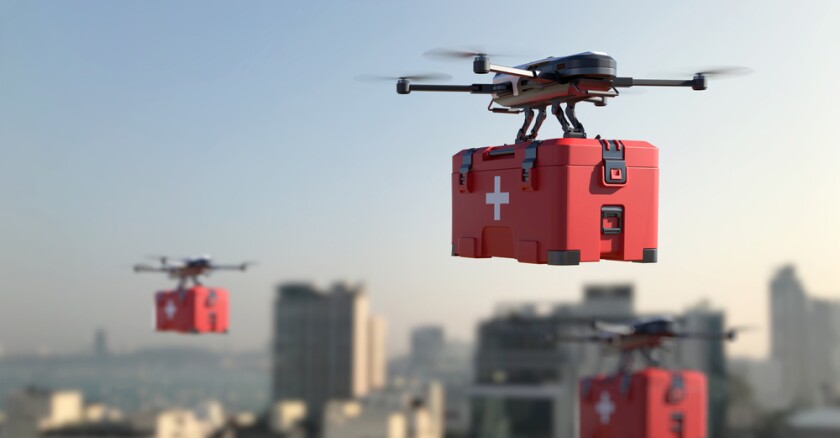German drone manufacturer Wingcopter and Denver-based air medical service provider Air Methods announced the partnership in a release this week.
HRMC Vice President Chuck Welch then discussed some details about the pilot project, dubbed "Spright."
"About a year ago we were contacted by a representative of Air Methods, which is the company really driving this drone initiative partnership," Welch said. "They are a world leader in medical air transport, including helicopters and airplanes. Because of our prior relationship with them in the air medical business, they were looking for a site to test, and we met all the criteria."
Those criteria, Welch said, included wide open spaces and a relationship with surrounding hospitals and laboratories for items to be flown between.
"There are not many overhanging structures [on the hospital grounds] and not too many obstacles [in-flight paths]," he said.
Initially, the flights will be just demonstration flights for the Federal Aviation Administration, to qualify the agencies to perform flights unguided by a pilot. Welch didn't know how long the certification would take to allow actual delivery flights.
"The drone will use GPS and cell towers essentially to fly themselves with onboard instruments," Welch explained. "What we're going to do will eventually be the modality for these flights."
Possible uses for the drones, which have a range of up to 68 miles with a maximum speed of 90 mph and payloads of up to 13 pounds, "are endless," Welch said.
They could include things such as delivering blood, medicines, or small medical devices to surrounding areas or transporting vaccines more quickly and efficiently.
Wingcopter's delivery drones use tilt-rotor technology, similar to the military Osprey, which facilitates vertical take-off and landing like a helicopter, with forward flight like a plane.
"The drones are six feet across, with eight rotors," Welch said. "They are battery operated."
The company already uses the technology in other parts of the world for medical delivery to areas unreachable by normal means, Welch said.
At the beginning, the flights will be between Hutchinson and McPherson hospitals, and then Cheney and perhaps as far as Ellsworth, Welch said.
"Initially, they'll be just unmanned flights [with no delivery loads] flying over unpopulated areas," he said.
The drones will use air space dedicated to medical air service to avoid conflict with commercial or private recreational flights.
"The other thing is this technology has accident-avoidance software in it," Welch said. "It will be able to change course on its own, to recognize obstacles and alter its flight. It's almost like artificial intelligence on board."
They anticipate flights will begin in October, though the details are still being worked out, he said.
"We're really excited and honored they chose to partner with us, of all the places in Kansas," Welch said.
Air Methods plans to integrate fleets of Wingcopter's new flagship delivery drone, the Wingcopter 198, into the company's existing infrastructure of more than 300 bases serving hundreds of hospitals across 48 states, according to a company news release.
"Our technology has been used globally to effectively deliver medical supplies, for example, insulin in Ireland, children's vaccines in Vanuatu, emergency medication in Malawi, and just recently, blood samples in Germany," Wingcopter CEO Tom Plümmer stated in a release on that company's website.
"Our vision to 'save and improve lives' resonates perfectly with Air Methods' legacy of providing lifesaving care, combined with Spright's ambition to improve the quality of healthcare across the U.S. by deploying fleets of Wingcopters, and we are excited about scaling this together," he stated.
In 2019, according to a report by Dronelife.com, Wingcopter worked with researchers at NUI Galway, Ireland to complete the world's first delivery of prescription medication and blood samples for diabetes care.
The company is also working on a drone-delivery program with pharma giant Merck to transport pigment samples from a Merck site in Gernsheim, Germany to a lab 15 1/2 miles away in Darmstadt
"The COVID-19 pandemic exacerbated some of the real challenges in our health care system creating an opportunity to find better solutions to extend access to healthcare, especially in rural America," Air Methods CEO Jaelynn Williams stated in the release. "We see Spright serving a vastly underserved market and playing a huge role in a future full of better outcomes for everyone."
©2021 The Hutchinson News, Distributed by Tribune Content Agency, LLC.








